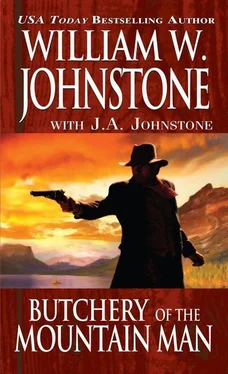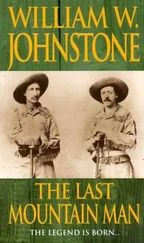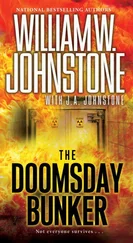John, who miraculously had not been wounded, walked over to sit on the stone fence and look back across the field, covered now with a low-lying fog of gun smoke. The smoke was so thick that the retreating Confederate soldiers were quickly enveloped by the cloud. What he could see, though, were the bodies of the dead, strewn across the field, many of which had been nearly cut in two.
The sounds on the battlefield which, but moments earlier had been the thunder of artillery fire, the rattle of musketry, and the challenging screams of men locked in deadly combat, had changed. Now the only sounds were the low moans and whimpers of the wounded. Many of the wounded were from John’s company, and he stopped by to see each one.
One of the wounded was Lieutenant Sanderson.
“How badly are you wounded, Bobby?” John asked.
“I don’t know,” Sanderson replied. He chuckled. “It hurt like hell when I was first hit, but the truth is, I don’t feel anything now.”
“I’ll get you to the aid station,” John offered.
“No, sir. Not before the men,” Sanderson replied.
John smiled, and put his hand on his friend’s shoulder. “That was a collective ‘you,’ Lieutenant. I intend to get all of you to the aid station.”
John mustered the rest of his company, and organized them to move the wounded, including Lieutenant Sanderson, to the aid station.
“Cap’n, do you reckon we’re goin’ to counterattack?” Sergeant Dunn asked.
“Do you want to leave as many blue-clad bodies out there as there are gray now?” John replied.
“No, sir.”
“I’m pretty sure General Hancock doesn’t want to either.”
Old Main Building, University of Colorado—
October 1923
“John’s prediction was correct,” Smoke said as he continued to tell the story. “The next day, July Fourth, General Lee started back to Virginia, leading a twenty-seven-mile-long train of hospital wagons. He halted his army at the flooded Potomac River and had his men dig in to fight another battle, but General Meade’s army was too battered and too exhausted to counterattack. Also his troops had used up almost all of their ammunition and would have to be resupplied before they could fight again.”
“What happened to all the dead the dying?” Professor Armbruster asked.
“The citizens of Gettysburg, the civilians, were left to deal with the thousands of wounded. They turned private homes, businesses, schools, and public buildings into hospitals. For some time afterward, infection and unsanitary conditions caused disease to spread through the town. But they didn’t have to handle it alone; volunteers came from the North and the South. Northerner and Southerner worked together to care for the wounded and bury the dead, regardless the color of the soldier’s uniform. They also piled up, and burned the carcasses of horses and mules killed in the fighting.”
[ It had been a grand plan with Lee proposing to take the offensive, invade Pennsylvania, and defeat the Union army in its own territory. Such a victory would have moved the fighting out of Virginia, bringing some relief to that beleaguered state, as well as strengthen the hand of those politicians in the North who wanted peace at any price. It was also believed that it would undermine Lincoln’s chances for reelection. It would reopen the possibility for European support that was closed at Antietam. The result of this vision was the largest battle ever fought on the North American continent. This was Gettysburg, where more than 170, 000 fought and over 40,000 were casualties.
In the grand scheme of things, Lee’s plans failed, but this battle is now referred to as the high-water mark of the Confederacy. From this point forward, victory for the South was unachievable. How many lives could have been saved, had the Confederacy realized then that further continuation of the war was a terrible waste.
It is now believed that this battle had a profound impact upon John Jackson, causing memories which remained with him for the rest of his life. Of course, John Jackson wasn’t the only one damaged by the terrible consequences of the battle at Gettysburg. As of the publication date of this book, it is sixty-two years since that terrible battle was contested, and there are still many survivors who continue to bear the scars, as does, indeed, our entire nation.—ED. ]
“Hold it up for a moment, will you, Professor?” Wes asked, his voice coming through the intercom box. “I have to set up a new disc.”
“Very well, tell us when you are ready,” Professor Armbruster replied. Then, taking his finger away from the toggle switch that activated the intercom, he spoke to Smoke.
“Jackson went all through the war without sustaining any wounds, didn’t he?”
“It depends on what you call wounds,” Smoke said. “He had the kind of wounds that you can’t see.”
“Traumatic shock.”
“I beg your pardon?”
“Jackson, undoubtedly, suffered from a syndrome known as traumatic shock. Last year, Dr. Walter Bradford Cannon, a noted physiologist, published a book on this very subject. It refers to a severe anxiety disorder that can develop after exposure to any event that results in psychological trauma, such as being in a war.”
“Yes. I’ve never heard of that term before, but it certainly had an effect on him.”
“You know, one of the things that I found most interesting in my research on John Jackson is that he did have a college degree,” Professor Armbruster said. “But he never used that degree. Instead, he lived for many years in the wilds of Montana and Colorado.”
Smoke chuckled. “I think the fact that John was an educated man did surprise a few people. But it wasn’t something that ever got in the way.”
“Got in the way?” Professor Armbruster replied. “What an odd thing to say, suggesting that, somehow, an education might get in the way.”
“Professor, could you see any of your contemporaries in academia doing what John Jackson did? And I’m not talking about his vendetta with the Crow, I mean the many years he lived in the mountains, surviving off the land.”
“No,” Armbruster agreed. “No, to be honest with you, Mr. Jensen, I don’t know that I, or any of my peers, could do that.”
“It’s because your education would get in the way,” Smoke said. “You have learned to expect certain privileges as your due, because of your academic position. It is always hard for anyone to function in a milieu that is vastly different from the environment to which they have become accustomed. John Jackson was able to do this.”
“I must confess, Mr. Jensen, that, given what I have read and heard about you, that I am—and please don’t think this to be patronizing, because I don’t mean it that way—but your language, your deportment, is considerably different from what I expected. Have I missed something in my research? Did you attend college?”
Smoke laughed. “Yes, the University of Sally.”
“I beg your pardon?”
“My wife was a schoolteacher when I met her. She never quit learning, or teaching. And she shared it all with me.”
“Well, I must congratulate her. She did a wonderful job with you.”
CHAPTER FOUR
“I’m ready when you are, Professor,” Wes said.
“Thank you, Wes. Give me a sign when you put down the stylus.”
Wes held his finger up, then brought it down.
“As we finished with the last recording disc you were telling us about John Jackson’s war experiences. Tell us, Smoke, did his war experiences have any effect on his personality?”
“Yes,” Smoke answered. “And that was especially so after the war. It was as if he were having a more difficult time being a civilian during peacetime, than he had being a soldier at war.”
Читать дальше












